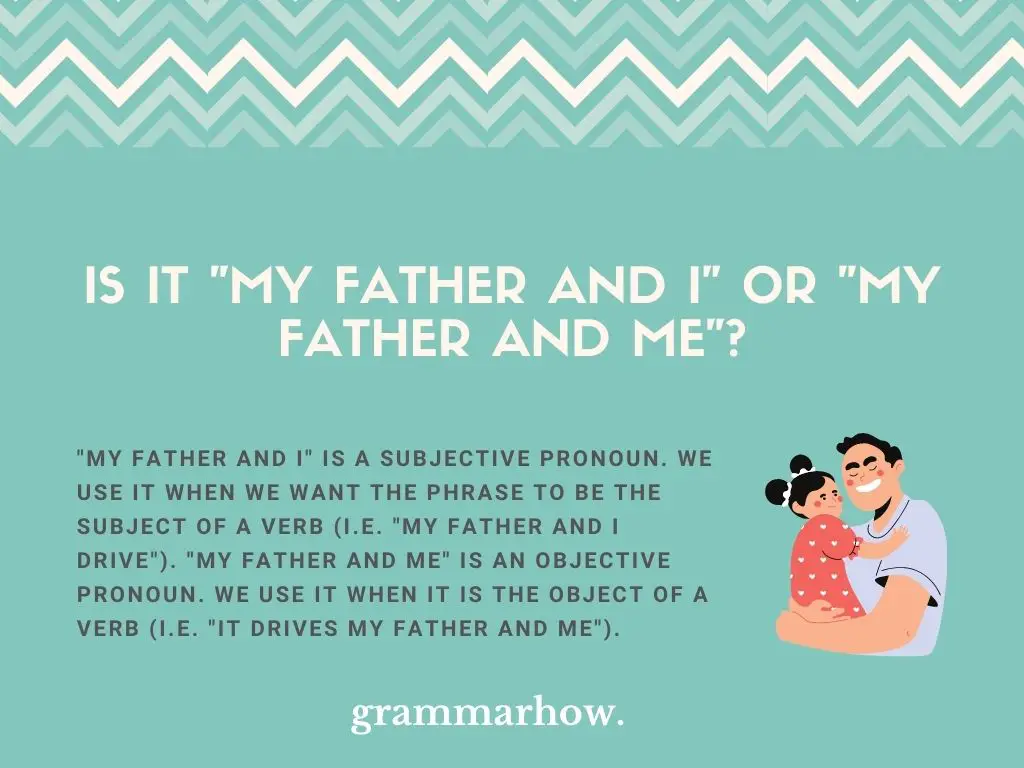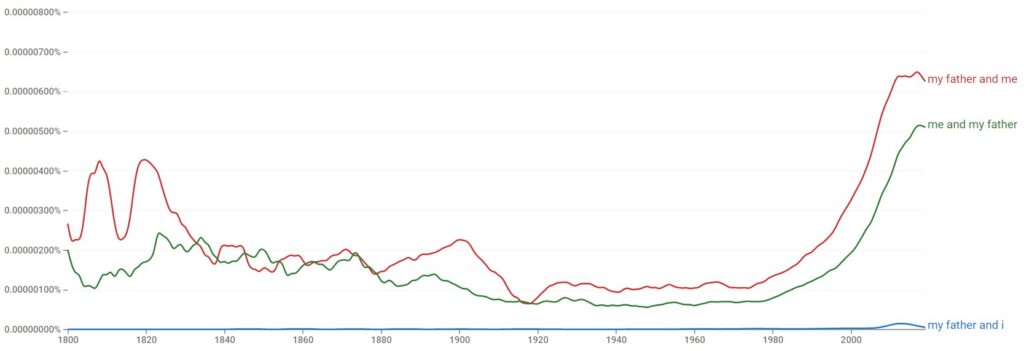It’s essential to understand the differences between subject and object pronouns. “My father and I” and “my father and me” are two great examples of applying these things. We’ll share all the rules with you to help you understand more about them.
Is It “My Father And I” Or “My Father And Me”?
“My father and I” is a subjective pronoun. We use it when we want the phrase to be the subject of a verb (i.e. “my father and I drive”). “My father and me” is an objective pronoun. We use it when it is the object of a verb (i.e. “it drives my father and me”).

Typically, we use “my father and I” to start a sentence or clause, while “my father and me” ends one. That’s the easiest way to remember the rules that differ between them.
Also, there’s a great tip that involves dropping “my father and” from the sentence. If you drop these three words and you can still understand the sentence, you know you have the correct form.
Here’s how it works:
- (My father and) I would like to invite you to our party.
- Will you be able to make it to see (my father and) me?
We included “my father and” in parentheses to demonstrate that it doesn’t need to be part of the sentence for it to make sense.
Examples Of How To Use “My Father And I” In A Sentence
It might help to go over some more examples to explain how it works.
- My father and I share the same opinion here, and we will not be moved from our stance.
- My father and I would like to talk to you about this. We think you’ve got a great idea, and we’ll help you develop it.
- My father and I knew there was something wrong with this. That’s why we checked it out.
- My father and I thought you already had this figured out. Why is it still not fixed?
- My father and I wanted to be here when you arrived, so we got on an earlier flight to make it happen.
- My father and I are going to the movie theater. Would you like to come with us?
“My father and I” is most common at the start of a sentence. We use it when a verb follows it because that allows us to use the collective pronoun as the subject of the verb before explaining what “my father and I” are doing.
Examples Of How To Use “My Father And Me” In A Sentence
The objective clause is different. It works when “my father and me” is the object of the verb, so some examples would help you with this.
- The money is for my father and me to share.
- You should check my father and me out more before letting us in next time.
- He’s going to the party with my father and me. Would you like to come too?
- There are no other places for my father and me to go. We’ve got to stay here.
- It’s not going to help my father and me. I wish you would help us somehow.
- Would you like to come with my father and me? I think you’ll have a really fun time.
“My father and me” works when it comes after the verb in the sentence. This allows us to treat the collective pronoun as an object. It’s most common for it to come toward the end of the sentence.
When Should I Use “Me And My Father”?
We have yet to mention “me and my father.” It seems plausible that it would also work, but we need to establish some rules before using it.
“Me and my father” is not officially correct. We typically avoid using it because it does not follow the polite English rules that mean the pronoun “me” always comes after the other objective pronoun we’re using.
The same applies no matter what person we use. “Me” should always be the second pronoun:
- My mother and me
- My father and me
- My uncle and me
- The king and me
It’s just a polite rule that is followed. However, “me and my father” can technically work in the same instances where “my father and me” works. Many native speakers still use it (even though it’s grammatically impolite).
It would be better for you to use “my father and me” in all cases, and we’ll demonstrate that here:
- Correct: Would you like to visit my father and me?
- Incorrect: You should come with me and my father to see this.
- Correct: It’s all about my father and me, and I think you’ll like it.
- Incorrect: I thought it was for me and my father.
Is “My Father And I,” “My Father And Me,” Or “Me And My Father” Used The Most?
According to Google Ngram Viewer, “my father and me” is used the most. However, “me and my father” is not far behind it. Even though we just showed you that it doesn’t work, it’s still interesting to see native speakers not following the standard rules.

While we do not encourage you to use “me and my father,” it’s clear that a native speaker wouldn’t call you out for being incorrect. This graph proves that the rules are confusing even for native speakers to understand.
Is It Ever Correct To Use “I And My Father”?
Unlike “me and my father,” which is sometimes used, “I and my father” is never correct. It follows the same rules where “I” has to come after “my father,” but it’s also incorrect because “and” can’t follow “I” because it’s always a subjective pronoun that needs a verb.
Is It “My Dad And I,” “My Dad And Me,” Or “Me And My Dad”?
The same rules apply to “father” and “dad.” We can still use “my dad and I” as a subject pronoun, and “my dad and me” is an objective pronoun. It’s still best to use pronouns after “my dad,” so “me and my dad” isn’t correct (though it’s still used).
You may also like:
Is It “John And I”, “John And Me”, or “Me And John”?
My Colleagues And Me/I/Myself? Best Version (Formal Writing)
“Me And My Family” or “My Family And I”? Correct Version
“You And I” Or “You And Me”? Here’s The Correct Spelling (+18 Examples)
“My Wife And I” vs. “My Wife And Me” vs. “Me And My Wife”
“Me And Someone” Or “Someone And I”: Which Is Correct? (12 Examples)
“My Mom And I” vs. “My Mom And Me” vs. “Me And My Mom”

Martin holds a Master’s degree in Finance and International Business. He has six years of experience in professional communication with clients, executives, and colleagues. Furthermore, he has teaching experience from Aarhus University. Martin has been featured as an expert in communication and teaching on Forbes and Shopify. Read more about Martin here.
